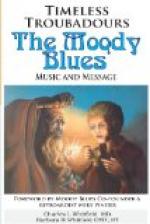Alfonso II. of Aragon (1162-1196) was a constant patron of the troubadours, and himself an exponent of their art. He belonged to the family of the counts of Barcelona which became in his time one of the [111] most powerful royal houses in the West of Europe. He was the grandson of Raimon Berengar III. and united to Barcelona by marriage and diplomacy, the kingdom of Aragon, Provence and Roussillon. His continual visits to the French part of his dominions gave every opportunity to the troubadours to gain his favour: several were continually about him and there were few who did not praise his liberality. A discordant note is raised by Bertran de Born, who composed some violent sirventes against Alfonso; he was actuated by political motives: Alfonso had joined the King of England in his operations against Raimon V. of Toulouse and Bertran’s other allies and had been present at the capture of Bertran’s castle of Hautefort in 1183. The biography relates that in the course of the siege, the King of Aragon, who had formerly been in friendly relations with Bertran, sent a messenger into the fortress asking for provisions. These Bertran supplied with the request that the king would secure the removal of the siege engines from a particular piece of wall, which was on the point of destruction and would keep the information secret. Alfonso, however, betrayed the message and the fortress was captured. The razo further relates the touching scene to which we have already referred when Bertran moved Henry II. to clemency by a reference [112] to the death of the “young king.” The account of Alfonso’s supposed treachery is probably no less unhistorical: the siege lasted only a week and it is unlikely that the besiegers would have been reduced to want in so short a time. It was probably invented to explain the hostility on Bertran’s part which dated from the wars between Alfonso and Raimon V. of Toulouse. This animosity was trumpeted forth in two lampooning sirventes criticising the public policy and the private life of the Spanish King. His accusations of meanness and trickery seem to be based on nothing more reliable than current gossip.
Peire Vidal, with the majority of the troubadours, shows himself a vigorous supporter of Alfonso. Referring to this same expedition of 1183 he asserted “Had I but a speedy horse, the king might sleep in peace at Balaguer: I would keep Provence and Montpelier in such order that robbers and freebooters should no longer plunder Venaissin and Crau. When I have put on my shining cuirass and girded on the sword that Guigo lately gave me, the earth trembles beneath my feet; no enemy so mighty who does not forthwith avoid out of my path, so great is their fear of me when they hear my steps.” These boasts in the style of Captain Matamoros are, of course, not serious: the poet’s personal appearance seems to have been enough to preclude any suppositions of the kind. In [113] another poem he sings




